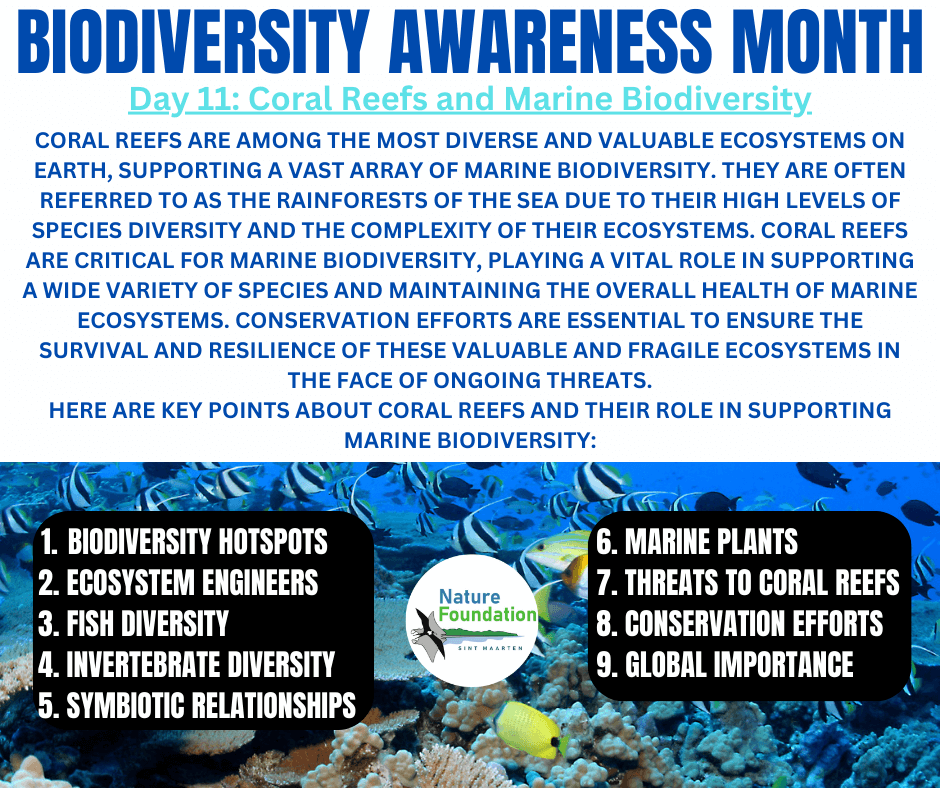Biodiversity month day 11: Coral Reefs and Marine Biodiversity
Coral reefs are among the most diverse and valuable ecosystems on Earth, supporting a vast array of marine biodiversity.
The St. Maarten Hospitality & Trade Association supports the March Biodiversity awareness month organized by the Nature Foundation in an effort to help protect St. Maartens nature and biodiversity. Todays topic: Coral Reefs and Marine Biodiversity
They are often referred to as the rainforests of the sea due to their high levels of species diversity and the complexity of their ecosystems. Here are key points about coral reefs and their role in supporting marine biodiversity:
1. Biodiversity Hotspots: Coral reefs are biodiversity hotspots, hosting a remarkable variety of marine life. Despite covering only, a small fraction of the ocean floor, coral reefs are home to approximately 25% of all marine species.
2. Ecosystem Engineers: Coral polyps, the tiny organisms that build coral reefs, are ecosystem engineers. They provide the framework for the entire reef structure. The nooks and crannies created by the coral branches offer shelter, breeding grounds, and feeding areas for a multitude of marine organisms.
3. Fish Diversity: Coral reefs are particularly important for fish diversity. They serve as habitats for numerous species of fish, providing shelter and breeding sites. Many commercially important fish species rely on coral reefs during various stages of their life cycles.
4. Invertebrate Diversity: In addition to fish, coral reefs support a diverse array of invertebrates, including sponges, mollusks, crustaceans, and echinoderms. These organisms contribute to the overall richness and complexity of the reef ecosystem.
5. Symbiotic Relationships: Coral reefs are known for their symbiotic relationships. Corals have a symbiotic relationship with photosynthetic algae called zooxanthellae. The algae provide the corals with nutrients through photosynthesis, while the corals offer a protected environment for the algae.
6. Marine Plants: Although not as conspicuous as on land, marine plants, such as seagrasses and macroalgae, also contribute to the biodiversity of coral reef ecosystems. These plants provide important habitats for various marine species.
7. Threats to Coral Reefs: Coral reefs face numerous threats, including climate change-induced coral bleaching, overfishing, habitat destruction, pollution, and ocean acidification. These threats can lead to the loss of coral cover and negatively impact the diverse communities that depend on coral reefs.
8. Conservation Efforts: Conservation initiatives aim to protect and restore coral reefs. These efforts include marine protected areas, sustainable fisheries management, coral restoration projects, and measures to mitigate climate change impacts. Involving local communities in conservation activities is crucial for the success of these initiatives.
9. Global Importance: Beyond their ecological significance, coral reefs provide essential ecosystem services such as shoreline protection, tourism revenue, and fisheries support. They contribute to the well-being of millions of people worldwide.
In conclusion, coral reefs are critical for marine biodiversity, playing a vital role in supporting a wide variety of species and maintaining the overall health of marine ecosystems. Conservation efforts are essential to ensure the survival and resilience of these valuable and fragile ecosystems in the face of ongoing threats.
Back to the Visit St Maarten Main page

